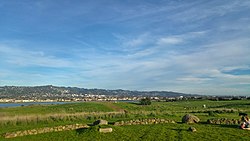César Chávez Park is a 90 acres (36 ha) city park of Berkeley, California named after César Chávez.[1] It can be found on the peninsula on the north side of the Berkeley Marina in the San Francisco Bay and is adjacent to Eastshore State Park.
| César Chávez Park | |
|---|---|
 | |
 | |
| Type | Urban park |
| Location | Berkeley, California |
| Coordinates | 37°52′21″N 122°19′10″W / 37.87241°N 122.31942°W |
| Area | 90 acres (36.42 ha) |
| Created | 1997 |
| Operated by | City of Berkeley, California |
| Open | 6 a.m. to 10 p.m. |
| Status | Open year round |


The park's east position in San Francisco Bay provides panoramic views of San Francisco, the Golden Gate Bridge, the Marin Headlands, and the East Bay hills. The park's terrain is characterized by very open grassy hills that have become popular for kite flying.[2] Paved paths run the perimeter and throughout the park where picnic tables and barbecue grills are available to the public.
Features
edit- Grassy areas for kite flying, "Frisbee" playing, etc. (no officially designated sports fields).
- Hiking on trails throughout the park; the 1.25-mile (2.01 km) Dorothy Stegmann trail around the park's perimeter is fully wheelchair accessible.
- Off-leash dog area (17 acres [6.9 ha]).
- Picnic tables with BBQ grills (several arranged for large groups).
- Solar Calendar.
- Wildlife sanctuary.
- The park's traditional public washroom was closed in 2015, but, in 2019, City Council considered replacing it with a more robust Portland Loo.[3]
History
editThe park began as a landfill dating back to 1957, when dikes were constructed for the purpose of containing municipal waste. In 1969, the city adopted the Marina Master Plan, which set aside the landfill area for unstructured recreation. In 1991 the city completely sealed the landfill and the park opened soon thereafter, originally as North Waterfront Park. In 1996, the city renamed the park after César E. Chávez, union leader and founder of the United Farm Workers of America.[1]
Landfill gas
editA landfill gas flare station lies on the eastern side of the park. Decomposition of the garbage below emits gases, primarily methane. To prevent its uncontrolled seepage from the ground, the gas is collected by over 40 extraction wells buried throughout the park and routed to the flare station, which then de-waters and burns it at over 1,470 °F (800 °C), converting approximately 99% of the collected methane into carbon dioxide.[4] Though both methane and carbon dioxide are greenhouse gases that contribute to the ongoing climate crisis, the conversion of methane to CO2 reduces its heat-trapping effectiveness by a factor of 25.[5]
A 1990 study reported low levels of methane seepage from the underlying waste and attributed the absence of gases to rapid oxidation by soil microorganisms.[6] As an alternative to the incinerator, local activists proposed to leverage the effect as a bioremediation method. The proposal was rejected by the Bay Area Air Quality Management District due to its experimental nature.[4]
In 2016, the waning flow of gas was unable to properly sustain the existing flare station, leading to problems including visible smoke, flames, and odor emanating from the chimney.[7] As a result, the original incinerator, which was built in 1989, was replaced with a newer, smaller model better designed to be sustained by the lesser supply of fuel.[8]
Activities
editPopular activities include model rocket launching, kite flying, drone and model airplane flying, picnicking, dog walking, jogging and walking. Although on a peninsula, the park has no access to the water because there are no beaches nor steps down through the park's reinforced shoreline.[1]
Events
edit- Solstice and Equinox celebrations at the Solar Calendar: Celebrations are held quarterly on the solstices and equinoxes. These celebrations include both scientific and cultural components. From the web site: "Many cultural celebrations are rooted in the cycles of the sun and moon, especially the solstices and equinoxes. For example, Easter, Passover, Narooz in the Spring, Rosh Hashanah, Kwanzaa, Christmas in the winter, etc."[9]
- Fourth of July Celebration and Fireworks: While most of this event is held elsewhere in the Marina, many people gather on the small hills at Cesar Chavez Park to watch the fireworks.
- Berkeley Kite Festival: Annual event held the last weekend in July. Hundreds of kites of all sizes are flown by amateurs and professionals. Thousands of people attend, making parking difficult.[10]
References
edit- ^ a b c Berkeley Department of Parks, Recreation & Waterfront Archived 2009-08-04 at the Wayback Machine
- ^ "Berkeley Kite Festival". The City of Berkeley. Archived from the original on 2007-10-15. Retrieved 2007-10-24.
- ^
Theresa Clift (2019-02-04). "'Civic responsibility' or crime magnet? Historic Sacramento park likely to get public bathroom". Sacramento Bee. Retrieved 2019-02-05.
The City Council will soon consider whether to approve the design and construction of a restroom in the park for $360,000. The "Portland Loo" style freestanding restroom would not just serve the homeless who congregate there but also the general public, said Councilman Steve Hansen, who represents downtown.
- ^ a b Nicolaus, Martin. "The Landfill Gas Flare Station". Chavez Park Conservancy.
- ^ "Importance of Methane". epa.gov.
- ^ Whalen, S.C.; Reeburgh, W.S.; Sandbeck, K.A. (August 1990). "Rapid Methane Oxidation in a Landfill Cover Soil". Applied and Environmental Microbiology. 56 (11): 3405–3411. doi:10.1128/aem.56.11.3405-3411.1990. PMC 184961. PMID 16348346.
- ^ "Flare Station Malfunction Spews Flames, Smoke, Stink". chavezpark.org.
- ^ "Flare station is replaced at Berkeley's Cesar Chavez Park". berkeleyside.org.
- ^ "Solar Calendars & The Rhythm of the Seasons". The Solar Calendar. 2010. Archived from the original on 9 September 2012. Retrieved 1 November 2010.
- ^ "Berkeley Kite Festival". Hghline Kites. 2010. Retrieved 26 November 2010.
External links
edit- César E. Chávez Park - City of Berkeley
- The Solar Calendar: A César E. Chávez Memorial - located on a hill on the west side of the park.